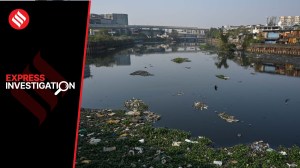Govt quot;backsquot; Tata Airlines proposal
NEW DELHI, Oct 21: It's probably of little consolation to the Tata group, but a Civil Aviation Ministry committee on sickness in private ...

NEW DELHI, Oct 21: It8217;s probably of little consolation to the Tata group, but a Civil Aviation Ministry committee on sickness in private airlines has backed its proposal whole-heartedly. The Tata proposal meets almost all the criterion listed by the committee to ensure that private airlines are viable and do not fall sick. The committee also recommends a 8220;more transparent and consistent8221; open skies policy!
Another recommendation that seems curious in the light of the Government8217;s opposition to the Tata project is 8220;that companies with proven financial and professional competence should be allowed in the aviation sector8221;.
The report has been referred to the Standing Parliamentary Committee on Aviation by Union Minister for Civil Aviation, Ananth Kumar on October 5. The report was submitted to Kumar in April this year. The five-member committee was headed by joint-secretary P K Brahma.
According to the report its recommendations provide a perspective on long term development of the aviationindustry.
The report recommends that the aircraft acquisition committee needs to be 8220;legitimised8221;. In order to avoid procedural delays the committee should be made an 8220;empowered8221; committee. After it has made its recommendations, Director General Civil Aviation DGCA should be able to issue necessary permits/orders within a week.
Given the Ministry8217;s determination to stymie the Tata airline another recommendation under the section headed 8220;entry of private airlines8221; makes interesting reading. The committee has recommended that the company should own at least 50 per cent of the fleet as proof of their stake and seriouness in the business. The Tata proposal fulfills this criteria.
Under the 8220;development8221; section the committee has recommended the creation of a statutory regulatory and enabling policy framework with an independent authority to monitor and shape the post-liberalisation development of an air transport system.
Criticizing the current system of seizure of aircraft by the Customs andAirport Authority of India the committee has said that this should be abolished without court orders. It states that these authorities should resort to other means for recovery of dues and should not take 8220;this extreme step which is crippling8221;.
Putting the blame on sickness of private airlines squarely on an unrealistic system of route dispersal guidelines issued by the Ministry the committee has recommended its scrapping. The report says that while it served its purpose at the initial stage, it lead to duplication of services, overcapacity and uneconomic operations. 8220;This is also a national waste in terms of fuel consumption and underutlization of capacities8221; says the report.
The committee has recommended that commercial routes should be valued on a scientific basis and be auctioned. The committee has also recommended that income tax on leasing charges for private carriers should be abolished, airport charges should be rationalised to provide relief to small operators and Aviation Turbine Fuel ATFprices made uniform across the country.
Interestingly the committee held hearings with chief executives of private airlines who were asked to provide answers to a questionnaire. Modiluft, Damania, NEPC, and East West were asked to submit written evidence and their suggestions to the committee.
The report states that the committee found their stand 8220;rather surprising8221; as they blamed the Government for their failure to sustain operations. The report states 8220;most of the private airlines were attracted to the industry by the glamour of the airline business. In some cases the board of directors mainly consisted of members of the family-husbands, wives, sons and daughters8230;8221;
- 01
- 02
- 03
- 04
- 05































